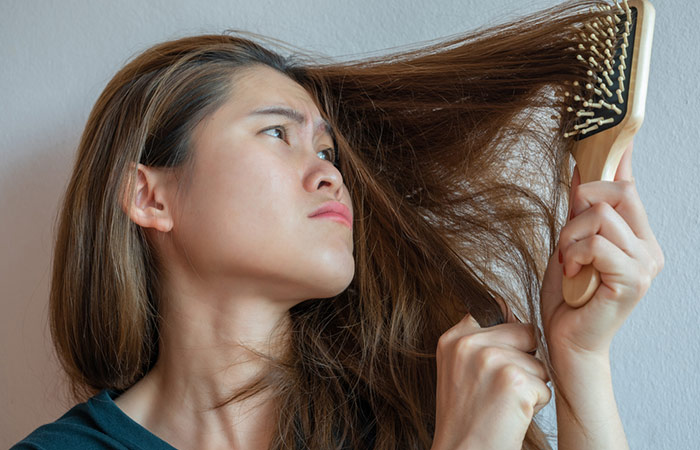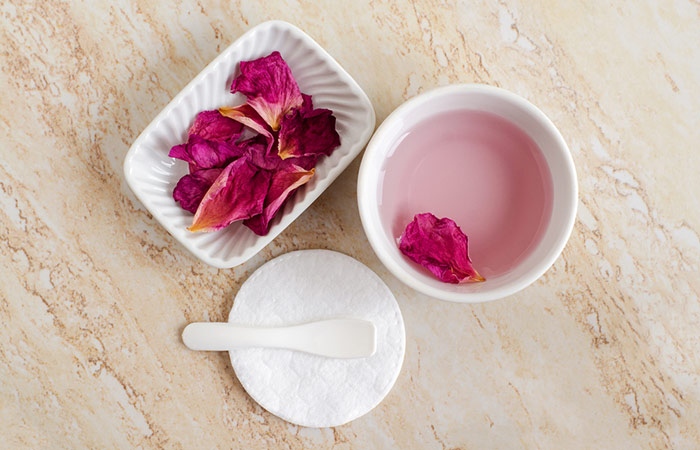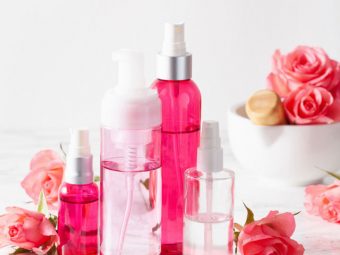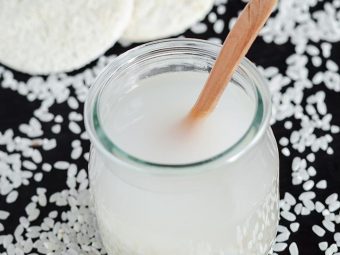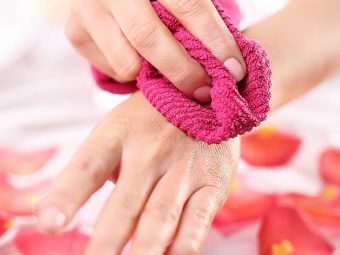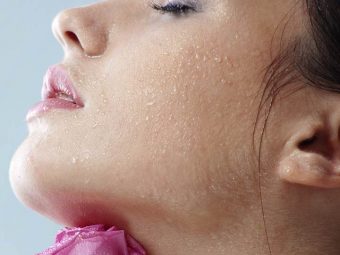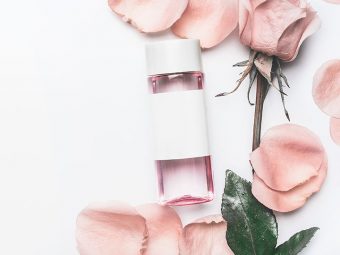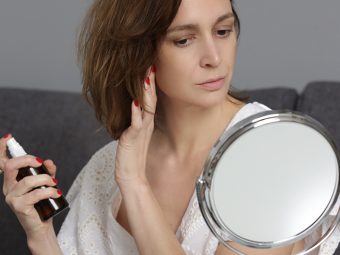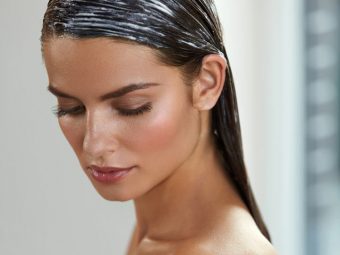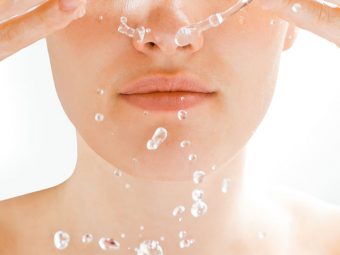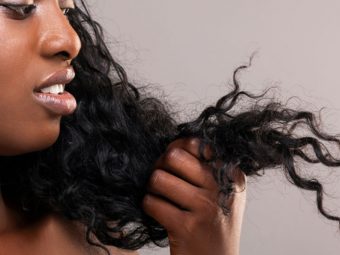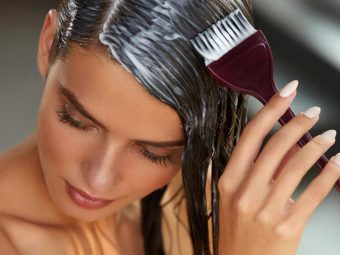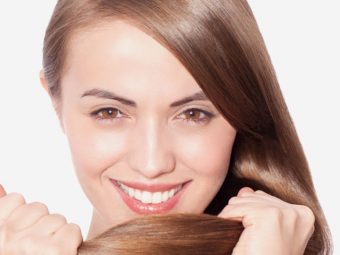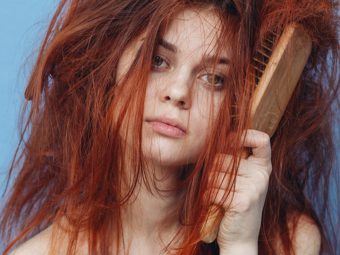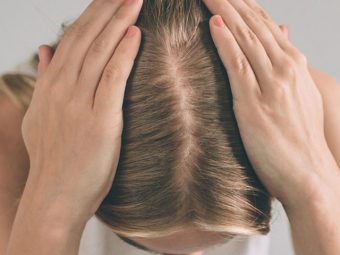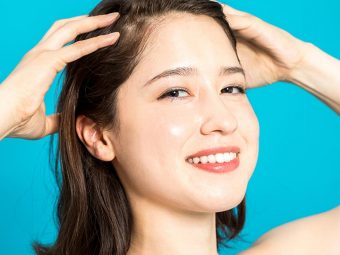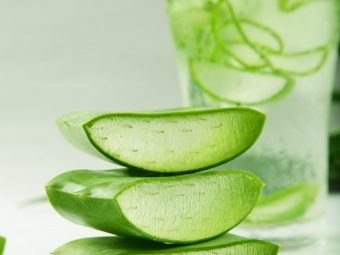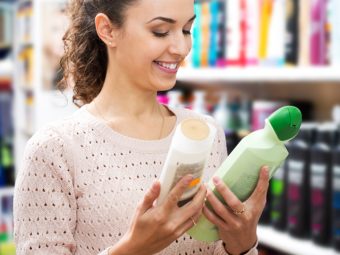How To Use Rose Water For Hair, Benefits, & DIY Methods
From hydrating the scalp to minimizing heat damage – this floral essence works wonders.
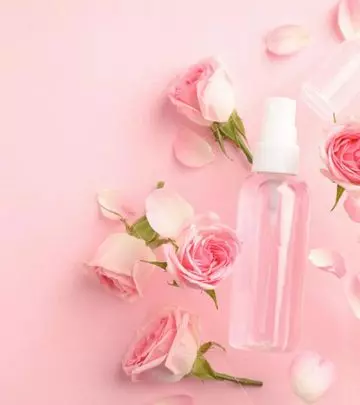
Image: Shutterstock
The benefits of rose water for hair are numerous. It has been a part of the hair care regimen for many years and offers visible results. It can strengthen your hair and can soothe the scalp. While there is no scientific proof to support the efficacy of rose water for hair, plenty of anecdotal evidence claims it to be good for hair. Rose water has astringent properties that help soothe the scalp and balance oil production. This makes it a better solution for your dandruff issues. As a good source of vitamins A, B3, C, and E, it can help improve the scalp and nourish the hair. Read on to know more about how rose water can benefit your hair. Scroll down.
 Know Your Ingredient: Rose Water
Know Your Ingredient: Rose WaterWhat Is It?
A light pink flavored water created by steaming rose petals.
What Are Its Benefits?
It may combat frizzy hair, reduce scalp irritation, and balance the hair’s pH levels.
Who Can Use It?
It can be used by everyone.
How Often?
You can apply it to your hair twice or thrice a week.
Caution
It may cause subtle irritation or redness in some individuals.
In This Article
Benefits Of Using Rose Water For Hair
1. May Soothe Scalp Irritation
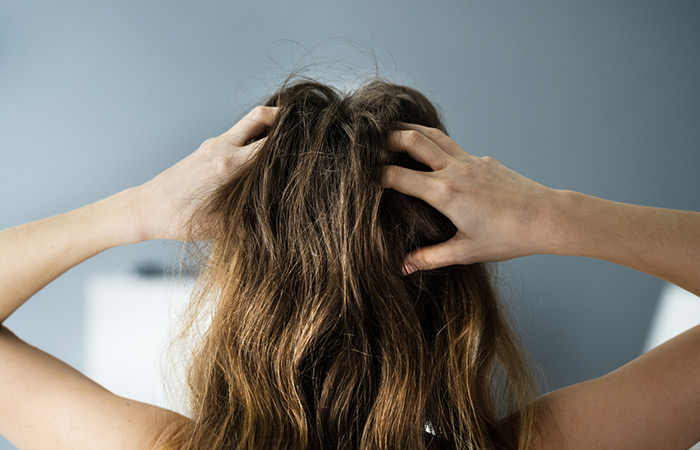
The natural astringent properties of rose water may help soothe scalp irritation and inflammation. Some research shows that rose petal extract has Anti-inflammatory properties (1). Rose water may also help reduce excess scalp oiliness and dandruff.
2. May Calm Your Senses
The calming fragrance of rose water cannot go unnoticed. It may lift your mood. Some believe its pleasant fragrance may also ease irritability, anxiety, or headaches.
3. May Maintain The pH Balance Of Your Hair
Anecdotal evidence suggests that the pHi XA chemical scale that determines the acidity and basicity of a solution by measuring the amount of hydrogen ions present in it. of rose water is similar to that of human hair. Hence, it may help maintain its pH balance. This promotes hair health and strength in the long run. Rosewater may also repair the damaged porosityi XThe ability of hair strands to absorb and retain moisture in the cuticles (the outermost layer of the hair). of natural hair.
4. May Help Reduce Frizz
A rosewater hair spray is especially helpful in tackling frizz in curly-haired women. It may also help give your curls a natural shine and make them bouncy.
Angelica, a YouTuber, tried rose water for hair growth and shared her experience in one of her vlogs: “I sprayed rosewater to my sectioned hair, and it acted as a natural astringent that helps remove excess oils and prevents dandruff. It also helps tame the hair and creates an environment that is suitable for hair growth (i).”
Now that you are aware of the role rose water plays in maintaining your hair, let us look at how you can prepare it.
How To Make Rose Water For Hair
Several brands today offer bottled rose water. For the best results, however, you may use homemade rose water. These are organic and provide effective results. Here is a step-by-step approach to preparing rose water at home:
Step 1
Take freshly harvested rose buds. Wash them and place them in a pot. You may also use dried rose petals instead of buds.
Step 2
Add distilled water to the pot. Ensure the water is just enough to cover the roses. Adding too much water may dilute the rose water too much.
Step 3
Cover the pot with a lid and allow the flower buds or petals to simmer for 30 minutes. Remove from heat and allow it to come down to room temperature. Strain and transfer the liquid into a spray bottle.
The rose water is now fit for use on your hair. It can last for a week when stored in a cool, dry place. Keeping it in the fridge can allow it to last for a month.
 Fun Fact
Fun FactNow that you know how to make rose water for hair and store it, let us understand how to use it.
How To Use Rose Water For Hair
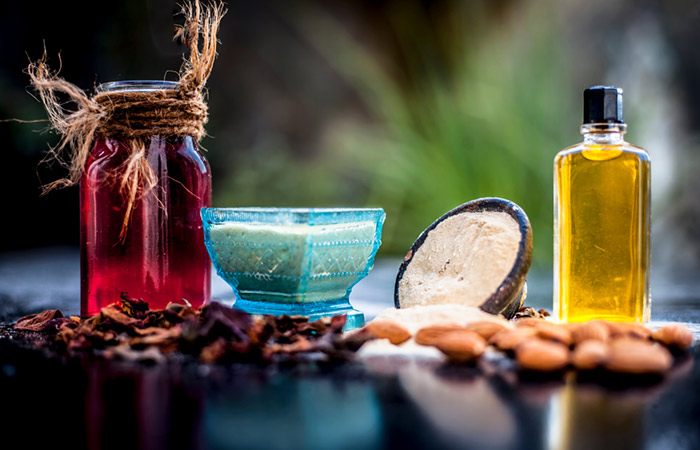
The versatility of rose water allows you to use it at different stages of your hair care regime.
- Shampoo
One of the simplest ways of leveraging the benefits of rose water for hair is to dilute your shampoo with it and wash your hair like you normally would. That way, you ensure your hair gets the nutrition from rose water every time you wash it.
- After-Shampoo Rinse
Use your homemade rose water as a final rinse for your hair after shampooing. This final rinse leaves a wonderful fragrance on your hair and boosts hair shine.
- Vinegar, Eggs, And Rose Water Hair Mask
Beat three eggs and mix them with half a cup of rose water. Massage your scalp with this mixture. Gently apply the mixture to your hair, starting from the roots to the tips. Allow this to sit on your hair for half an hour before you rinse it with a mild shampoo and lukewarm water.
- Hair Mist
Choose a high-quality, pure rose water that is free of additives or preservatives to use as a hair mist. Pour the rose water into a clean spray bottle. Ensure your hair is clean and dry for effective absorption. Hold the spray bottle about 6-8 inches away from your head and spray it all over your hair, focusing on the roots and lengths. Avoid saturating your hair, as a light mist is usually sufficient. Gently massage your scalp to help distribute the rose water or use a wide-tooth comb for even application. There is no need to rinse it out, and you can style your hair as usual after application.
- Glycerin And Rose Water For Dry Hair
Mix equal quantities of glycerin and rose water. You may also add these to a hair spray bottle for efficient application to the hair and scalp. Let the mixture sit on your hair for an hour before you rinse.
- Organic Rose Water For Hair
You can also simply rinse your hair with rose water. It provides hydration to dry hair and also nourishes it from the roots.
If your hair is normal to oily, you can consider using a mixture of one part rose water and two parts water. You may also add a few drops of tea tree essential oil to this solution. This helps control the oil secretion in the scalp and is beneficial for those with dandruff.
With such easy application techniques, there is no reason you should not start using rose water today. However, you must consider certain things.
 Quick Tip
Quick TipWhat To Keep In Mind While Using Rose Water For Hair
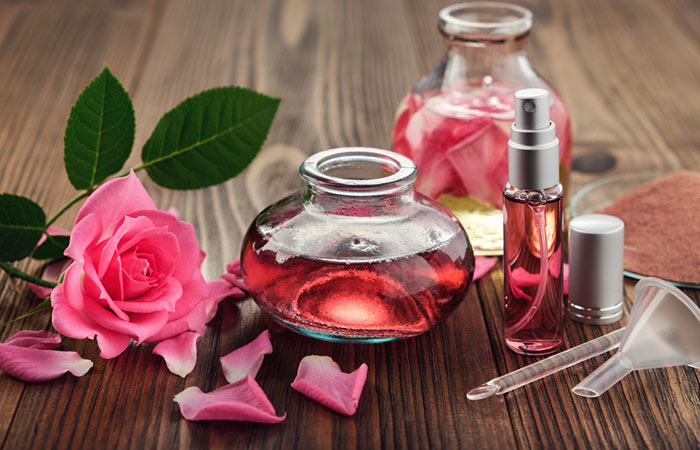
- Choose rose water free from sulfur, parabens, and other toxins. If possible, prepare rose water at home.
- The shelf life of homemade rose water is shorter than that bought in a store. Hence, store and use accordingly.
Infographic: Rosewater For Hair: Benefits And And How To Use
Rosewater not only has a pleasant scent but is also rich in vitamins A, C, and E, which can help improve your overall hair health. It balances the natural pH of your scalp and revitalizes your hair. Scroll down and check out the infographic below for its benefits and tips to add it to your hair care regimen.

Illustration: StyleCraze Design Team
Using rose water for hair care is a traditional practice due to its calming, anti-inflammatory, and astringent properties. It helps tackle excess scalp oiliness, reduces scalp irritation, combats frizz, and restores the pH of your hair. Fortunately, you can make rose water at home and use it for moisturizing your hair and nourishing it from the roots. Dilute your herbal shampoo with rose water for added benefits or rinse your hair with this organic rose water after shampooing. You can also use rose water to make hair masks. If you are going for a store-bought product, choose the one without sulfur, parabens, and other toxins.
Frequently Asked Questions
Can I mix rose water with coconut oil for hair?
Yes, you can mix rose water with coconut oil. Mix 1 cup of rosewater with three tablespoons of coconut oil. Pour the mixture into a spray bottle and store it in a cool place. You can use it as a leave-in conditioner or pre-wash hair treatment.
Are rose water and aloe vera good for hair?
Yes, a combination of rose water and aloe vera may stimulate hair growth and improve overall hair health (2).
Does rose water increase facial hair growth?
There is currently no scientific evidence that suggests rose water may increase facial hair growth.
Can I use rose water daily?
You can apply rose water on your hair twice or thrice a week as a leave-in conditioner or pre-wash treatment. You may use it in your beauty routine daily.
Can a teenager use rose water?
Yes, a teenager can use rose water on their hair twice or thrice a week for smooth and healthy hair.
Does rose water have vitamin E?
Anecdotal evidence suggests that rose water contains essential nutrients like vitamin E. This may increase hair number and protect the scalp from oxidationi XA chemical reaction or process that occurs when an element comes in contact with oxygen, causing the loss of electrons. For example, rust. (3).
Key Takeaways
- Rosewater can strengthen your hair and soothe scalp irritation.
- You can prepare rose water at home with rosebuds and petals.
- Rosewater can be used at different stages in hair care regimens.
- You can dilute your shampoo with rose water, use it as a final rinse after shampooing, and add it to hair masks.
Learn how to use rose water to keep your hair healthy and beautiful! Discover if you can leave rose water in your hair and the benefits it can bring by clicking on the video below.
Personal Experience: Source
StyleCraze's articles are interwoven with authentic personal narratives that provide depth and resonance to our content. Below are the sources of the personal accounts referenced in this article.
i. OVERNIGHT ROSE WATER FOR FAST, THICK HAIR GROWTH (2 WAYS TO USE ROSE WATER FOR MASSIVE HAIR GROWTH)https://www.youtube.com/watch?v=175Hdi1w16g
References
Articles on StyleCraze are backed by verified information from peer-reviewed and academic research papers, reputed organizations, research institutions, and medical associations to ensure accuracy and relevance. Read our editorial policy to learn more.
- Skin antiinflammatory activity of rose petal extract (Rosa gallica) through reduction of MAPK signaling pathway
https://www.ncbi.nlm.nih.gov/pmc/articles/PMC6261181/ - A Close Look at Aloe Vera Barbadensis and It’s Effect on Hair Health
https://www.researchgate.net/publication/342588964_A_Close_Look_at_Aloe_Vera_Barbadensis_and_It%27s_Effect_on_Hair_Health - Effects of Tocotrienol Supplementation on Hair Growth in Human Volunteers
https://www.ncbi.nlm.nih.gov/pmc/articles/PMC3819075/





